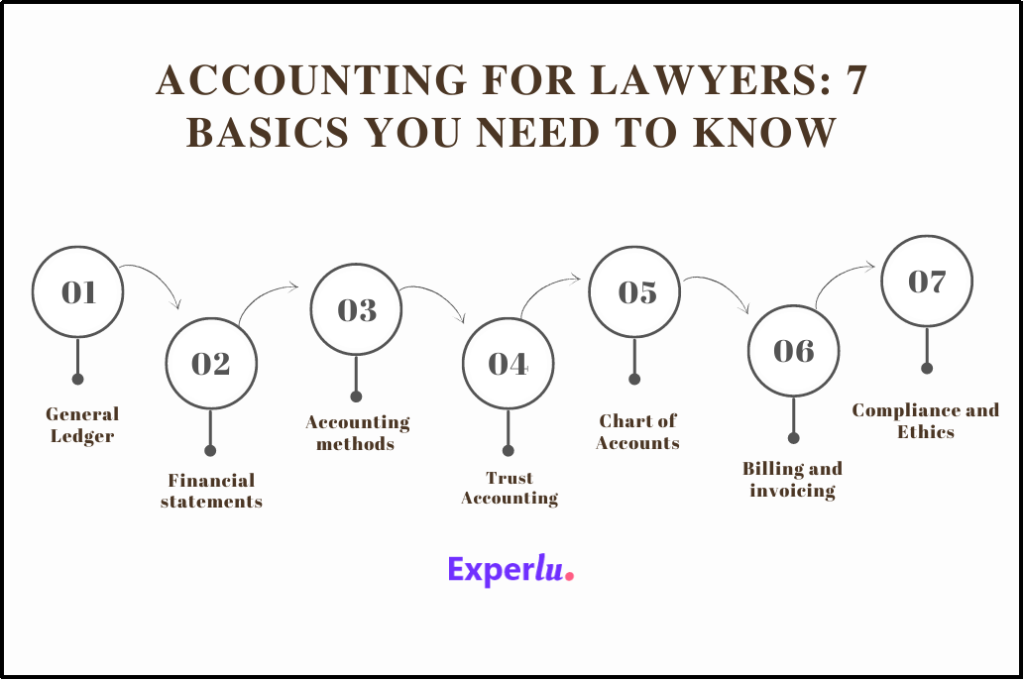Modern professionals must wear multiple caps to progress in their field. The same applies to lawyers, who must be familiar with accounting to advise their clients on transactions, employment, disputes, finance, etc.
Financial accounting for lawyers isn’t optional; it’s essential to the company’s success, profits, and good reputation.
Accounting for Lawyers UK assists in building better relationships with financial and banking organisations, adhering to accounting law, and preparing precise, compliant tax forms. In this blog, we shall explore the 7 basics you need to know about accounting for lawyers.
Table of Content
Key takeaways
- Lawyers must manage billable hours, maintain accurate financial records, and follow strict accounting standards, especially for trust accounting.
- Familiarity with financial statements is essential for monitoring a law firm’s financial health and making informed decisions.
- Upholding ethical standards like client confidentiality, conflict avoidance, and honest financial practices is crucial for maintaining trust and integrity in the legal profession.
What is accounting for lawyers?
Accounting for lawyers involves the different accounting methods lawyers use to meet the legal profession’s rules, financial needs, and tax obligations while running their practice.

Examples of common accounting duties for lawyers involve:
- Monitoring billable hours and expenditures
- Maintaining law firm accounting records
- Managing client trust accounts
- Ensuring compliance with accounting rules and regulations
Understanding the essentials: Accounting Basics for lawyers

General Ledger
Accounting for legal professionals will always involve managing and utilising a general ledger.
A general ledger is a complete track of a law company’s financial transactions, separated into transaction types, such as revenues, expenses, assets, liabilities, and owner’s equity.
This information is required to produce accurate financial statements. The general ledger will also be the foundation for your double-entry accounting system. The double-entry accounting method monitors where a lawyer’s cash is coming from and where it’s going.
Every financial transaction results in two entries: a “credit” and a “debit.” These records are entered in the general ledger to show whether the cash is being transferred to or from an account.
If you haven’t seen your general ledger or don’t look at it frequently, it is time to change that. One of the most important aspects of your legal practice is finance, and you should be involved in it. Start by knowing the basics of the general ledger.
Financial statements
Financial statements offer comprehensive information about your company’s past, present, and potential financial situations.
There are three vital accounting records that lawyers should be familiar with:
- Income statement or profit and loss account: Demonstrates the performance of your legal company over a certain period.
- Balance sheet: Indicates your firm’s assets, liabilities, and shareholder equity at some point.
- Cash flow statement: Depicts how much cash is coming in and going out of the company over a particular time frame.
Accounting methods
Accounting goes beyond simply crunching numbers at month-end; it provides insight into a company’s overall financial health and status.
Managing accounting can be done in a variety of ways. Here are three common techniques of accounting:
- Cash basis: The simplest approach that records revenue when it’s received rather than when services are provided.
- Accrual basis: Income is recorded at the time of billing rather than at the time of payment.
There is no particular answer for which method to use; every legal firm has its requirements to consider when making this decision. However, consistency in sticking with an approach once you’ve decided on it, rather than switching between techniques, is essential. However, bigger practices must use the accrual basis of accounting.
Trust or Clients Money Accounting
Trust accounting is one of the most important elements of legal accounting. Funds held ‘in trust’ for clients must be handled with the greatest possible degree of care and accountability to prevent potential ethical or legal violations.
Compliance in trust accounting necessitates several safeguards, such as:
- Keeping separate trust funds for each client
- Avoiding the mixing of trust funds with the company’s operating revenues
- Keeping track of every transaction involving these accounts
- Regular inspections and three-way reconciliation
Chart of Accounts
This is a list of all your company’s financial accounts, providing you a structure for where to record every transaction.
While the chart of accounts is tailored to your law firm’s size, jurisdiction, and practice region, it usually comprises five core categories in addition to the multiple subcategories.
These five core categories are:
- Owner’s equity
- Revenue
- Expenses
- Assets
- Liabilities
Understanding the charts of accounts for lawyers is crucial because it helps in properly categorising and managing funds.
Billing and invoicing
Billing and Invoicing in the legal sector are intricate procedures beyond sending payments to clients. They entail accurate time tracking, setting appropriate hourly rates, and generating detailed invoices that ensure fair compensation and builds customer trust.
Comprehensive invoices should accurately describe services rendered, such as duties performed, the time spent on each task, and the associated charges. This transparency assists in justifying expenses to clients and can avoid disputes over billing.
In addition, incorporating modern billing software will simplify the process, enhance accuracy, and boost client satisfaction through offering easy-to-read, professional invoices.
Compliance and Ethics
Compliance with accounting norms and ethical guidelines is necessary for lawyers, ensuring transparent financial procedures and integrity. They must follow legal standards, keep correct records, and go through audits to ensure everything is in order.
Ethically, lawyers must prioritise client confidentiality, avoid conflicts of interest, and handle financial transactions honestly and diligently. Maintaining these standards preserves the integrity of the legal profession while fostering confidence with stakeholders and clients.

Final thoughts
Accounting for legal firms may be new or difficult, but it does not have to be challenging. The key is to ensure accuracy in every aspect to meet ethical standards and enable your firm to thrive.
Once you know the basics, you can consider hiring an expert accountant for law firms from Experlu. They can assist in levelling up your company and make the legal accounting procedure even smoother by incorporating legal accounting and practice management applications into your firm’s toolkit.









